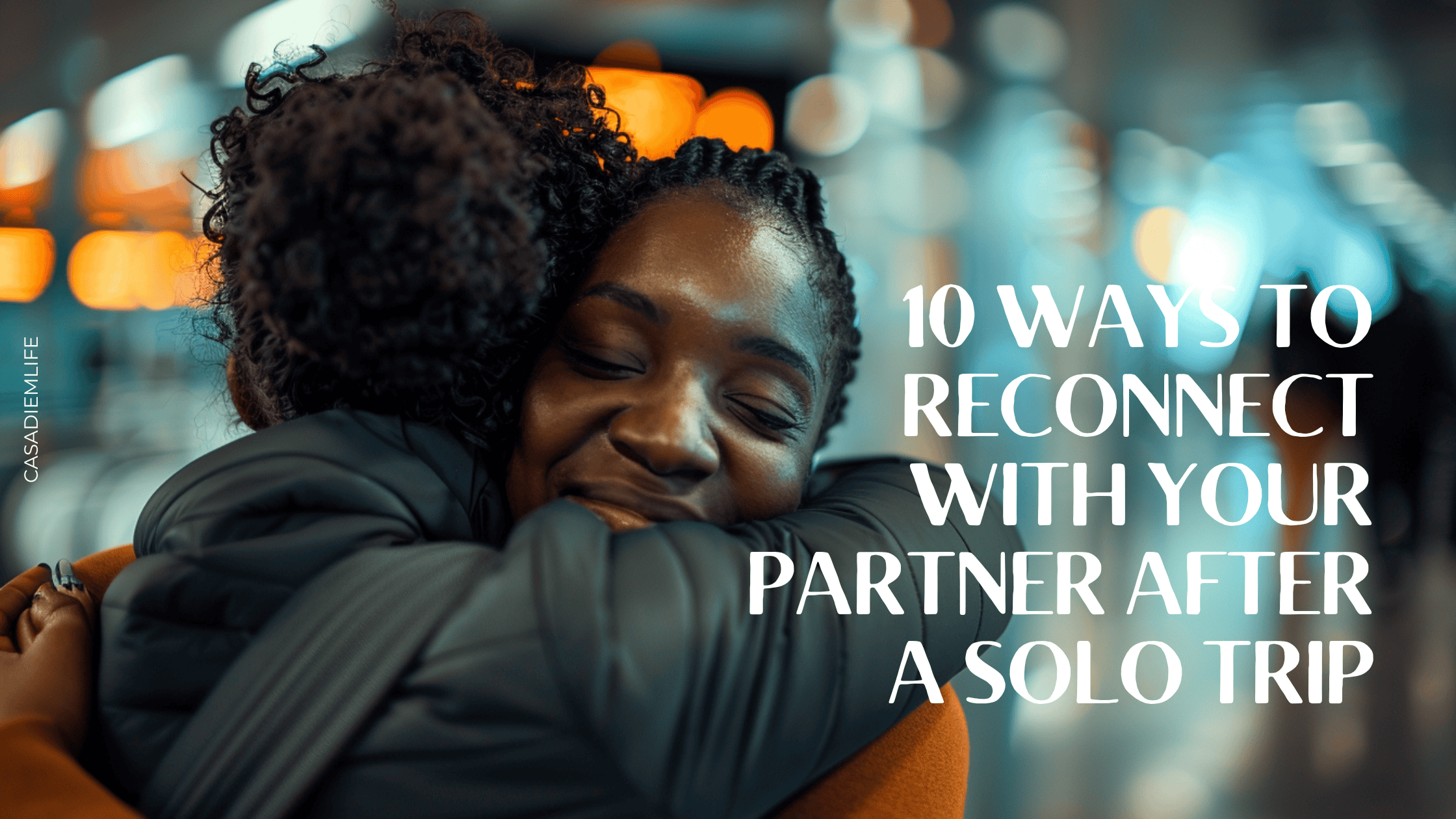
Some of the articles on Casa Diem Life may contain affiliate links. If you click and make a purchase, I might earn a small commission at no extra cost to you. It's just one way we keep the journey going! Find out more in my Privacy Policy.
A few years ago, I got really into solo travel and fell in love with the idea of ‘finding myself.” I am, apparently, very lost and need to find myself often. There’s just something about stepping onto that plane and being free from the gravitational pull of the daily grind that I can’t resist.
However, after the third solo trip that culminated in a big, nasty, blow-up fight with my usually cool-as-a-cucumber husband, I wondered, Am I the drama? Is it me?
As it turns out, all that liberating ‘me time’ was creating distance between hubby and I’s shared experience. That was when I decided to get intentional about making the transition from ‘me time’ to the ‘we time’ a little less bumpy.
Read on to learn 13 ways to reconnect with your partner after a solo trip.
Don’t have time to read it all?
Here’s a cheat sheet on how to reconnect with your partner after a solo trip:
(1) Start with gratitude. (2) Share stories. (3) Get help. (4) Plan a Reconnection Retreat. (5) Add new interests into your routine. (6) Set new goals together. (7) Volunteer together. (8) Start a friendly competition. (9) Engage in deep conversations. (10) Plan a trip together.
The Value of Solo Travel in Personal Growth
Solo travel pushes you out of your comfort zone, challenging you to independently navigate unfamiliar environments and situations. This autonomy is empowering, enhancing your confidence and self-reliance.

Making decisions solo teaches you to trust your judgment and confront your fears, contributing to a stronger sense of self.
Moreover, solo trips provide the luxury of introspection. Away from the daily grind and the roles you play in the lives of others, you’re afforded the space to reflect on your life’s direction, values, and aspirations.
How Independence Enriches Relationships
Contrary to the fear that time apart may lead to disconnection, solo travel can strengthen a couple’s bonds.
Independence is a critical component of healthy relationships; it ensures each partner can find happiness and fulfillment outside the relationship, enriching their time together.
When one partner takes the opportunity to explore and grow independently, they bring back new perspectives and experiences to share, injecting fresh energy and ideas into the relationship.

This dynamic fosters a deeper appreciation for each other’s individuality and each partner’s unique contributions to the relationship. It encourages a balance between togetherness and autonomy, preventing the sense of being taken for granted that can sometimes occur in long-term relationships.
So What’s The Problem With Solo Trips?
Picture this: you’ve just returned home from Peru, and your heart is brimming with tales of your life’s most exhilarating solo journey.
You’ve spent the entire plane ride curating pictures and rehearsing the dramatic tales you will spin as soon as you burst through the door! You imagine cuddling under blankets with steaming cups of tea, his eyes wide with wonder as you regale him with tales of sunset hikes through the Andes.
You swing the door open and see your befuddled husband grappling with a toddler as he tries in vain to gentle-parent his way through a tantrum. His eyes lock onto yours, and he practically screams, “Oh, thank God you’re home.” It’s not because he missed you—no—it’s because toddler one has just stolen the toy from toddler two, and all hell is breaking loose.
You feel like a deflated balloon as you mediate the sharing of Malibu Barbie. At some point during negotiations, your husband snuck away and locked himself in a closet so he could listen to some soothing rain sounds.
When you finally unpack your memories – hours later, while you load the dishwasher – his reaction is less than enthusiastic. In fact, he seems annoyed that you went on this trip in the first place.
The above story is based on actual events, but it’s not the whole story.

Imagine that your partner has just left on a once-in-a-lifetime trip. You’re both psyched for the adventure ahead, but as soon as she leaves, your eldest child develops a fever, and your youngest child decides he no longer wants to eat anything that has ever existed.
You can’t take time off work because your colleague’s kid also has a fever, and he called out sick first, so you’re juggling double work duties and a cranky kid by yourself.
By day three, the house resembles a battlefield. Unfinished meals are piled in the sink, none of the socks in the house match, and you’re pretty sure there’s a rebellious faction of Barbies plotting to overthrow the current administration.
Your partner sends pictures from Machu Picchu, and while you’re genuinely happy that they’re having a fantastic time, you can’t help but feel a twinge of resentment.
Finally, the door swings open, and a heavenly light shines upon your fresh-faced wife. “Oh, thank God you’re home,” you scream as you launch your toddler like a javelin into your wife’s arms and flee.
That night, your wife tells you a few stories about her adventures as you clean up the kitchen. You’re fighting to stay awake, but you nod politely and think, “Please don’t ever leave me again.”
This situation is a prime example of how two things can be true simultaneously. Solo trips can be invigorating for the partner who travels and debilitating for the partner who stays behind.
Why Disconnection Happens During Solo Trips

Disconnection or conflict after a solo trip is a complex phenomenon that stems from a variety of sources, including:
- Different Experiences: One partner may feel left out or unable to relate to the other’s new experiences and personal growth.
- Independence vs. Dependence Dynamics: The traveling partner’s increased sense of independence might unsettle the relationship’s balance of dependence and interdependence.
- Communication Gaps: Lack of effective communication before, during, or after the trip can lead to misunderstandings or feelings of neglect.
- Jealousy or Insecurity: The partner who stayed behind might feel jealous or insecure about their partner’s experiences or connections while away.
- Routine Disruption: Difficulty reintegrating into the family or relationship routine after being away.
While one partner may return recharged and filled with exciting stories, the other might have struggled to maintain daily life in their absence, leading to envy, resentment, or isolation.
The contrast in experiences can create a chasm, making it challenging to reconnect and share the lessons learned from each person’s adventures.
Open Communication: Laying the Groundwork For A Solo Trip
The foundation of successfully reconnecting with your partner after a solo trip is laid well before you pack your bags. Effective pre-trip communication is not just about logistics; it’s about aligning expectations, sharing aspirations, and reinforcing your commitment to each other.
This stage is crucial for maintaining intimacy after travel and ensuring both partners feel secure and valued, even while apart.

Expressing Hopes and Aspirations
Share your hopes for what you wish to gain from this experience, whether it’s a deeper understanding of yourself, new skills, or simply the peace that comes from solitude.
Encourage your partner to express their own aspirations for the time apart, perhaps focusing on personal projects or hobbies.
This mutual sharing fosters a supportive environment, emphasizing growth and development as a couple, even during physical separation.
Setting Expectations
Begin with an open discussion about your upcoming journey. Clearly articulate why you feel a solo trip is necessary for your personal growth and how you envision it benefiting you as an individual and your relationship.
Address any concerns your partner may have and discuss how you can support each other during this period. Setting clear expectations about communication frequency and means can help mitigate feelings of neglect or anxiety.
Reasonable Expectations For The Traveling Partner
For the partner embarking on the solo trip, it’s reasonable to expect:
- Communication: They should keep to the agreed-upon communication plan, sharing experiences and checking in regularly to maintain connection and reassure the partner back home.
- Transparency: Openly sharing plans, locations, and new acquaintances helps in building trust and alleviating any concerns of the staying partner.
- Respect for Agreed Boundaries: Adhering to any boundaries set during the pre-trip conversation is crucial for maintaining trust and respect.
Unreasonable Expectations For The Traveling Partner
While it’s essential to maintain communication and respect agreed boundaries, certain expectations can only be classified as patently unreasonable. Here are a few:
- Daily Souvenir Deliveries: As much as you would like to be honored daily, this would be an exhausting and expensive drain on your partner.
- Live Streaming: Don’t let FOMO (Fear of Missing Out) get the best of you! Allow your partner the freedom to live in the moment and send you highlights instead of a live stream.
- Instant Expertise: Anticipating that a two-week yoga retreat will turn your partner into a stoic Himalayan monk is unfair.

Reasonable Expectations For The Partner Staying Behind
The partner remaining at home also has essential responsibilities:
- Support and Understanding: Offering emotional support and understanding the trip’s value to their partner’s personal growth.
- Independence: Engaging in their own activities or hobbies, showing that they can maintain their household, autonomy, and well-being during their partner’s absence.
- Trust: Expressing trust and confidence in their partner’s decisions and actions while away, avoiding unnecessary suspicion or jealousy.
Unreasonable Expectations For The Partner Staying Behind
- Domestic Mastery: Assuming that the absence of one’s partner is the perfect opportunity to master the art of cooking despite previously struggling to boil water.
- No Communication Allowed: Expecting no communication at all during the trip as if being on a remote yoga retreat meant being stranded on a deserted island.
- No Fun Allowed: Believing that the partner should not be allowed to have any fun or leisure activities while away. Just because they’re staying home doesn’t mean they must be miserable.
For other ideas on how to prepare for a trip, read about the 7 safety habits you should adopt before you travel.
Staying Connected During a Solo Trip
While the essence of a solo trip is to immerse yourself in personal exploration, maintaining a healthy connection with your partner is key to avoiding conflict after the fact.
Establish a communication plan that suits both of you. Exploring creative ways to keep your partner updated during a solo trip can transform this aspect of communication into a delightful part of your shared experience.
For instance, creating a daily highlight reel of photos and videos can give your partner a vivid glimpse into your adventures, allowing them to feel a part of your day.
You could also send a “picture of the day” featuring something unique or something that reminded you of them, turning it into a fun guessing game of why you chose that picture.
Voice notes, with their personal touch, convey emotions and immediate reactions that texts might not, making the distance feel shorter.
For those artistically inclined, sketching or creating small pieces of art as a daily memento to share upon return can be a beautiful way to document and share your experiences.
If nothing else, commit to a once-daily check-in when you are both in a quiet, private place so that you can talk with intention.
These methods keep the connection strong and build a rich tapestry of memories you can both cherish.
The Reunion: 10 Ways to Reconnect With Your Partner After A Solo Trip
Here are ten creative and practical ideas to reignite the spark and deepen your connection after a solo trip:

1. Start with Gratitude
Expressing gratitude for the time apart and your reunion will set a positive tone for the rest of your interactions. Sincerely thank your partner for their support and understanding while you were away. Share three things you appreciate about them.
2. Share Stories
Organize a special evening where you share stories and photos from your trip. Make it interactive by connecting your experiences to the dreams and plans you share as a couple. This can help your partner see the journey through your eyes, fostering a deeper emotional connection.
3. Get Help!
Schedule a cleaner, babysitter, or laundry service soon after your return so you can both get some relief as you transition into being together again.
4. Plan a Reconnection Retreat
Organize a weekend getaway or a special day out for just the two of you. Choose activities that both of you enjoy and that encourage communication and closeness. Some ideas include a couples spa day, a scenic hike, or a cooking class.
5. Incorporate New Interests into Your Routine
If you’ve discovered a new hobby or interest during your trip, introduce it to your partner. Exploring it together can add an exciting dimension to your relationship.
You can find some ideas on 7 ways to enjoy travel without leaving home in this article.
6. Set New Goals Together
Use the post-trip energy to dream big. Sit down together and set new goals, personally and as a couple. Planning for the future can be a powerful way to reconnect and ensure you’re both moving in the same direction.
7. Volunteer Together
Choose a cause or a community project you’re passionate about and volunteer together. This shared experience can foster a deeper connection and a sense of teamwork.
8. Start a Friendly Competition
See who can complete a 14-day streak on Duolingo first. Challenge each other to a Scrabble tournament. Sign up for a fun run and train together. Incorporating friendly competition into your relationship can be both fun and motivating.
9. Engage in Deep Conversations
Set aside time for deep, meaningful conversations. Use prompts or question cards designed for couples to explore each other’s thoughts and feelings on various topics. This can enhance emotional intimacy and understanding. Here are a few starters:

- “What have you discovered about yourself while we were apart?” This question opens the floor for personal reflections and insights gained while apart, offering a deeper understanding of each other’s growth.
- “What experiences during our time apart do you think shaped you the most?” Focusing on experiences allows couples to share significant moments and their impacts, fostering a sense of shared growth and development.
- “If you could change one thing about our relationship based on what you’ve recently learned or felt, what would it be?” This encourages honest conversation about the relationship’s dynamics and areas for improvement or change.
- “What new dreams or goals have you developed during our time apart?” Discussing new aspirations or changes in old ones can realign the couple’s future direction together, ensuring both partners are moving towards shared and individual goals.
- “How can we better support each other’s growth based on our time spent apart?” This question aims to understand how both partners can contribute to each other’s personal development and happiness, reinforcing teamwork and mutual support.
10. Plan a trip together!
Traveling is an excellent way to explore new cultures and experiences, create memorable moments, and deepen connections. Having something big and exciting to look forward to together can be a powerful motivator to keep the relationship thriving.
Read my guide to planning epic, budget-friendly vacations to get started!
Professional Support: When The Tricks Aren’t Doing The Trick
If you are struggling significantly with reconnection, seek the guidance of a relationship counselor or therapist.
Professional support can provide a safe and neutral environment for both of you to express your feelings and concerns. A therapist can facilitate healthier communication and understanding by introducing effective strategies tailored to your unique situation.
This could help address underlying issues that are difficult to resolve independently, leading to a stronger and more connected relationship.
Which of these tips on reconnecting have you tried? Share your best tips for transitioning from ‘me time’ to ‘we time’ in the comments!
Feeling inspired? Pin it for later!




Hi, I'm Chioma Ikoku, a spirited explorer and a peace-loving homebody. I founded Casa Diem Life to help you combine the excitement of travel with the comfort of home, because I believe that adventure begins at home.
Want to read more?
Receive the latest posts, exclusive content, and special offers right in your inbox.
Explore the ways we can work together on the resources page









